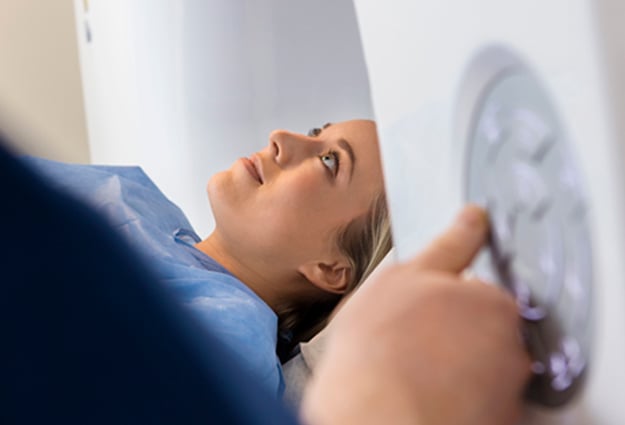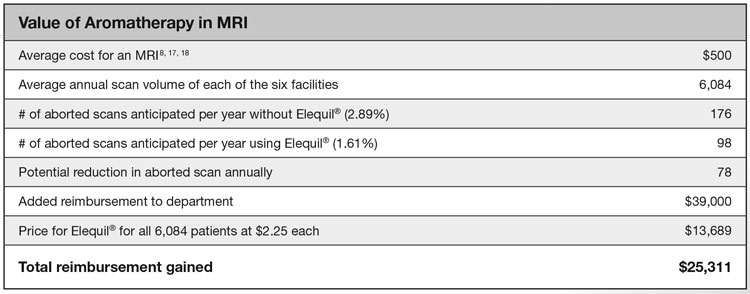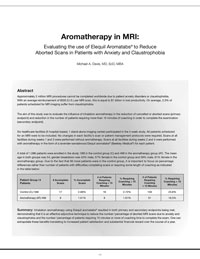
Did you know that close to 2 million MRI exams are aborted each year due to patient anxiety or claustrophobia across the globe?
That's a lot of lost scans resulting in $1 billion annually in lost productivity to the imaging facility, not to mention a poor, and sometimes traumatic, experience for the patient.
Anxiety/Claustrophobia a Safety Concern
With an average of 2.3% patients scheduled for an MRI suffering from claustrophobia, it can also be a safety issue. The Joint Commission, the organization that accredits and certifies nearly 21000 health care organizations and programs in the United States, added a provision to their performance standards outline for MRI safety in July, 2015.
Imaging facilities that offer MRI are to have policies and procedures in place that "address strategies for calming or responding to the anxious or distressed patient, including where, when, and how medications for anxiety are to be handled.1"
Non-Pharmacological Strategies for Calming Patients in MRI
With sedation viewed as a last resort, many of these strategies involve distraction techniques like breathing and visualization exercises, earplugs to block sound out or headphones to bring sound in via the music of choice, eye masks, virtual reality goggles, and inhalation aromatherapy just to name a few.
A recent study evaluated the effectiveness of inhalation aromatherapy on reducing the number of aborted or cancelled scans as well as the number of patients requiring more than 15 minutes of coaching time from the MRI technologist to complete the scan.
This study involved 6 facilities and employed a protocol that was designed to be as simple and non-disruptive as possible with no change in each facilities protocols over a 4 week period with all patients scheduled for an MRI to be included.
Patients receiving scans in weeks 2 and 4 received inhalation aromatherapy in the form of lavender-sandalwood Elequil aromatabs® (Beekley Medical), while those patients in weeks 1 and 3 acted as a control group without inhalation aromatherapy.
Results:
A total of 1,086 patient were enrolled in the study. 588 in the control group (C) and 498 in the aromatherapy group. It should be noted that because there were 90 more patients in the control group, it is important to focus on the percentage differences rather than number of patients in the chart below.

The results demonstrate that inhalation aromatherapy is an effective alternate strategy to reduce the number of aborted MRI scans due to anxiety and claustrophobia in addition to reducing the amount of patients needing coaching time greater than 15 minutes.
Impact on Reimbursement
Reducing the number of aborted scans and decreasing the amount of time MR techs spend coaching patients through their scans is good for the bottom line. The author extrapolated the data from the study and projected how much total reimbursement could potentially be gained annually through the use of inhalation aromatherapy in MRI.
The annual scan volume at each of the six facilities averaged 6,084. Using the failure rate percentage in each of the study groups, he estimated total number of 176 aborted scans annually without the use of inhalation aromatherapy. That number drops to 98 per year when inhalation aromatherapy comes into play.
Estimating the average cost of an MRI to be $500, those additional 78 patients who were able to complete their scans with the help of inhalation aromatherapy represent a gain in reimbursement to the department of $25,311 with the cost of Elequil® as the inhalation aromatherapy factored in as outlined in the chart below:

To learn more, download your copy of "Aromatherapy in MRI:Evaluating the use of Elequil Aromatabs® to Reduce Aborted Scans in Patients with Anxiety and Claustrophobia" by clicking on the thumbnail below or contact Beekley Medical at 1-800-233-5539 (+1-860-583-4700) to request a trial evaluation with your patients.

Download paper
1"Checklist for New Joint Commission Safety Requirements" MRI Metal Detector Blog, Jan 9, 2014
Related articles:

Mary Lang Pelton
Director of Marketing Communications
